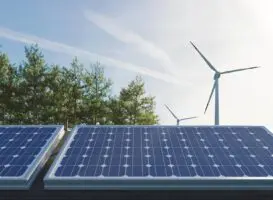
Electric vehicles are cool. They’re inexpensive to operate, can make our air cleaner, and help reduce the amount of climate change-causing gases released into the atmosphere. But right now, they’re also mostly just for rich people. The initial cost of buying the car, combined with their limited availability, is just too much for most people to justify making the switch.
That could soon change, though, because investment pundits think that Tesla Motors is on the verge of achieving something big: A battery cheap enough to make electric vehicles cost-competitive with conventional cars. Daniel Sparks at Motley Fool is reporting that the company is on the right track towards developing a battery that costs only $100 per kilowatt-hour — a cost widely believed to be the threshold where electric vehicles can finally be cost-competitive.
There are a few reasons for this, Sparks writes. The central one is that the company plans to build something called the “Gigafactory,”a giant $5 billion battery manufacturing plant with 6,500 workers. The second is CEO Elon Musk’s own admission that he would be “disappointed” if it took his company 10 years to make a $100 per kilowatt battery pack, and suggested it might happen before 2020.
Sparks acknowledges that CEOs make overzealous predictions all the time. But what makes him more confident that Tesla will be able to achieve the cost reductions necessary to make the battery pack is that Panasonic — a company “arguably more knowledgeable and experienced regarding lithium-ion production than any company in the world” — apparently admitted that Tesla has been making “conservative predictions” about how quickly it will be able to reduce costs. (Panasonic isn’t a disinterested party, though; it’shelping Tesla build the Gigafactory.)
“There is still room for doubting,” Sparks wrote. “But Tesla and Panasonic’s growing confidence certainly makes a good case for the enormous potential of the Gigafactory.”
If the planned Gigafactory is going to be key to Tesla’s success with a cheap electric car battery, it’s still going to take a couple years. That’s because the Gigafactory isn’t even built yet. In fact, Tesla’s not even sure where it’s going to put it, and there’s a fierce competition between at least five states over which one is going to house it.
Musk did recently announce that the company had placed a construction pad in Nevada, but he also said the company may “do something similar in one or two other states” so that the early stages of construction are complete when the decision is finally made. Which state Tesla decides to put the factory in depends on the incentive packages state governments are willing to give Tesla in exchange for heightened economic activity.
The main reason for having a huge factory dedicated to building these batteries is the simple fact that a lot of people want electric cars, but automakers don’t have enough batteries to make them. Musk said the Gigafactory would be able to produce 500,000 vehicles every year. That’s a huge increase from current production rates — as Forbesnotes, the batteries produced at the gigafactory in one year would be “more than the entire worldwide production of lithium-ion cells in 2013.”
With the heightened production, Musk says battery costs will eventually be able to be cut by about 30 percent. Tesla doesn’t disclose how much batteries cost it now, but Anthony Ingram at Green Car Reports notes that general predictions are that the company pays $200 to $250 per kilowatt hour, the lowest of any electric automaker.
As of now, transportation — the whole gambit of cars, trucks, trains, and planes — is thelargest single source of air pollution in the country. Needless to say, air pollution causes respiratory conditions like asthma and bronchitis, and increasing the risk of cancer and cardiovascular disease.
There has been growing debate over whether the proliferation of electric cars will actually put a substantial dent in air pollution or greenhouse gas emissions, mainly focused on the power source of the electric car battery. If the power charging the battery comes from a fossil fuel plant, some say that the lifecycle environmental and health damages of an electric vehicle can actually be greater than gasoline-powered cars.
However, as Sierra Club points out, electric vehicles do emit significantly less air pollution when they are operated in places like California, which relies more heavily on renewables like hydropower to generate electricity. Lifecycle emissions from electric cars drop even further as we retire more coal plants and switch to cleaner sources of power. To find out how clean your electric car would be today in the state you’d charge it in, you can plug your zip code into the EPA’s “Beyond Tailpipe Emissions Calculator.”
Source: Climate Progress. Reproduced with permission.








